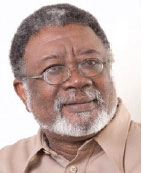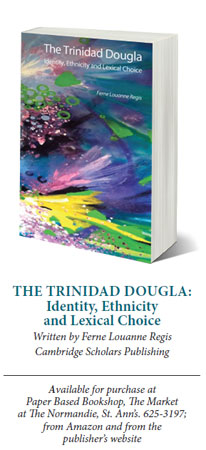
 “The Trinidad Dougla: Identity, Ethnicity and Lexical Choice” responds to the most significant responsibility of The UWI as an institution: to identify, explore, and explicate the essentials of Caribbean self. “The Trinidad Dougla: Identity, Ethnicity and Lexical Choice” responds to the most significant responsibility of The UWI as an institution: to identify, explore, and explicate the essentials of Caribbean self.
If the region is to rise out of the debilitating ef fec t s of learned helplessness brought on by such questionable philosophies as First, Second and Third World status or even Developed and Developing status and Globalisation, it becomes important for institutions such as the regional university to confront the society with its own face and its own realities. The need for continuing self-awareness, interrogation and informed-ness is fundamental to the regional remit.
The task is a complex and formidable one which requires perseverance, imagination and a will to explore in depth cardinal aspects of Caribbean being. Even more daunting is the need to interrogate the situations and to present findings in a form that could interest, and be accessed by the wider audiences which the information should target.
“The Trinidad Dougla” represents a serious attempt to address the essentials of the remit set out here. The work focuses on a group of persons within Caribbean societies, Guyana, Trinidad and Suriname, in particular, who, despite their increasing visibility have not been the target of any serious academic research beyond a scattering of analyses and conference presentations.
The first significant step in the work is the use of the name “Dougla” to refer to a specific group within the society. The simple insistence on using Capital “D” in the spelling of the name lifts the group to which it refers to a status similar to Indian, African, Syrian. It is a call to refer to me and my group by our name (spell it with a capital letter). This capitalisation, by itself, is a signal to the region to address the many marginal groups that the nations of the region have learnt to take for granted and about whom a number of dangerous myths and stereotypes have assumed a veneer of truth.
The work itself is published within the Cambridge Scholars Publishing, which dedicates 10% of its publishing output each year to theses and dissertations that have significant scholarly implications. The challenge is to present a work that maintains its scholarly standards while at the same time holding an appeal for every person whose life it is intended to enhance. This work succeeds in significant ways in meeting these requirements.
The seven chapters and the preface provide information at varying levels of academic sophistication. The first two focus on the issues at the core of the work.There is a clear indication of the distinctions to be observed between and among the critical concepts of race, and ethnicity and an indication of how these are linked to nationalism. It also sets the Dougla issue at the heart of the discussion.
 The Dougla individual is further contextualised through exploration and examination of the historical underpinnings of the societies that gave rise to this group. The exploration of societies with a similar experience in other societies places the work in a wider context and facilitates comparison and contrast across the respective historical experiences of the mixed groups. This helps the reader to a further and more refined appreciation of the significance of the work. The Dougla individual is further contextualised through exploration and examination of the historical underpinnings of the societies that gave rise to this group. The exploration of societies with a similar experience in other societies places the work in a wider context and facilitates comparison and contrast across the respective historical experiences of the mixed groups. This helps the reader to a further and more refined appreciation of the significance of the work.
The remainder of the work is more tightly focused on the research processes, the findings and the implications. Here, the rigour and protocols of academic research present a different set of challenges for both writer and reader. The writer must retain the rigorous academic research conditions and requirements while seeking to maintain contact with an audience with wide and varying levels of skills and competences. This Ferne Louanne Regis adroitly manages to do.
From an academic point of view, the work succeeds in outlining with a close attention to detail the research processes engaged in the study. It is faithful to these and presents a good model for academic research of this kind. From the theoretical perspective, the work addresses a dilemma of much of Caribbean research where the contexts of operation often challenge orthodoxy. This work shows an awareness of significant relevant research approaches. Ultimately, it makes use of three significant conceptual frames, Communities of Practice, Social Networking and Accommodation interaction, to bring clarity to what might otherwise have been lacunae in the research findings.
One significant challenge that the writer had to face was the justification of the use of lexical items to determine personal allegiances within the mixed group contexts. This was challenging because one of the input groups could not readily be seen or determined to have an input at the lexical level.
This work holds important information for several publics. For the lay Caribbean person as well as for the student in secondary education and early tertiary education, the work encourages a review of stereotypes. “The Trinidad Dougla” confronts issues of definition and the systemic failure to include a section of the population whose significance keeps rising in the context of empowerment and national development.
Ian Robertson is a retired Professor of Linguistics at the St Augustine Campus
Ferne Louanne Regis PhD, teaches in the Faculty of Medical Sciences Centre for Medical Sciences Education and is Course Instructor in the MA English Language programme at the Open Campus |





